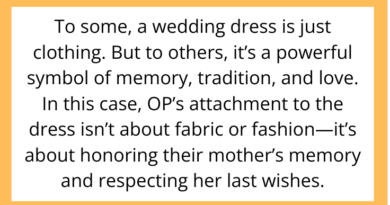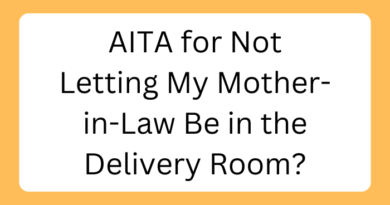AITAH for Refusing to Help My Cousin After He Lost His Job?
Sometimes, family support has a limit—even when everyone thinks you should always step up. That’s exactly what happened to one Reddit user when their unemployed cousin asked for financial help and a place to stay, only to react with anger when they said no.
This AITAH story looks at where generosity ends and self-preservation begins—and whether you’re really obligated to rescue a relative who’s never supported you in return.
The Original Poster (OP) explained that they grew up in a large extended family where everyone often leaned on each other. Their cousin, however, had a long history of unstable jobs, poor money management, and borrowing from relatives without paying them back. OP’s parents had bailed him out several times already.

When the cousin was fired again, he reached out to OP for a “temporary” place to stay and help covering bills “just for a few months.” OP politely declined, explaining they were saving to buy a home and couldn’t afford extra expenses.
The cousin exploded, accusing OP of being cold and selfish. Other relatives started calling OP heartless, claiming family is supposed to be there “no matter what.”
Now OP wonders: Am I the jerk for refusing to help someone who never helped me?
Family Support or Emotional Blackmail?

The Line Between Generosity and Enablement
One of the most discussed points in the Reddit thread was whether helping in this situation would actually be supporting the cousin—or just enabling more irresponsible choices. Many users shared similar experiences of relatives who treated family assistance as an endless safety net.
Saying no isn’t cruel if it prevents a pattern from repeating itself. It’s called a boundary.
“Family Means Everything”—But Does It Mean Everything is Your Responsibility?
Cultural expectations often dictate that we should sacrifice to help relatives. But there’s a difference between helping someone who’s genuinely trying to improve and someone who relies on others to clean up their messes.
OP didn’t refuse out of spite—they were protecting their own stability.
Reddit’s Verdict: Not the Jerk

The AITAH community overwhelmingly agreed: You’re not the jerk.
Here are a few top comments:
“Helping doesn’t mean you’re obligated to bankrupt yourself. You’ve helped enough.”
“If he has a history of not repaying or getting back on his feet, you’re just prolonging the problem.”
“Family loyalty doesn’t mean tolerating financial abuse.”
Redditors also noted that while empathy matters, you can care about someone without sacrificing your own well-being.
Emotional Guilt Trips: A Common Manipulation

When “No” Turns Into a Character Assassination
It’s not unusual for people to react badly to hearing “no”—especially if they’re used to others caving in. In OP’s case, the cousin escalated quickly from disappointment to character attacks. This reaction is a tactic: if you feel guilty enough, you might change your mind.
That doesn’t make their behavior acceptable.
Protecting Your Peace Isn’t Selfish
Boundaries are about self-respect, not cruelty. OP wasn’t cruel—they were clear about their limits. It’s okay to say: “I’m not in a position to help.”
What Could Have Been a Compromise?

Some users suggested potential middle grounds:
-
Offering short-term help with job applications, but not housing or money
-
Providing leads for community resources or employment services
-
Agreeing to help only under strict repayment terms
But ultimately, even compromise isn’t required if trust has been broken too many times.
Final Thoughts: Boundaries Aren’t Betrayal

This AITAH story highlights a universal truth: you can love someone and still say no to them.
You are not the jerk for:
-
Protecting your finances
-
Avoiding a repeat of past situations
-
Refusing to take on responsibilities that aren’t yours
It doesn’t mean you don’t care. It just means you care about yourself, too.



